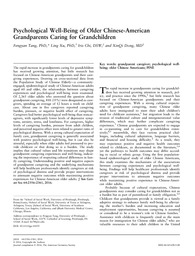
ATTENTION: The works hosted here are being migrated to a new repository that will consolidate resources, improve discoverability, and better show UTA's research impact on the global community. We will update authors as the migration progresses. Please see MavMatrix for more information.
Show simple item record
| dc.contributor.author | Tang, Fengyan | |
| dc.contributor.author | Xu, Ling | |
| dc.contributor.author | Chi, Iris | |
| dc.contributor.author | Dong, XinQi | |
| dc.date.accessioned | 2017-03-02T19:39:54Z | |
| dc.date.available | 2017-03-02T19:39:54Z | |
| dc.date.issued | 2016 | |
| dc.identifier.citation | Published in Journal of the American Geriatrics Society, 64(11): 2356-2361, 2016 | en_US |
| dc.identifier.uri | http://hdl.handle.net/10106/26480 | |
| dc.description.abstract | The rapid increase in grandparents caring for grandchildren
has received growing attention, but little research has
focused on Chinese-American grandparents and their caregiving experiences. Drawing on cross-sectional data from
the Population Study of Chinese Elderly—a communityengaged, epidemiological study of Chinese-American adults
aged 60 and older, the relationships between caregiving
experiences and psychological well-being were examined.
Of 2,365 older adults who answered the question about
grandparent caregiving, 818 (35%) were designated as caregivers, spending an average of 12 hours a week on childcare. About one in five caregivers reported caregiving
burden, pressure, or negative health effect of caregiving.
Caregivers had better psychological well-being than noncaregivers, with significantly lower levels of depressive symptoms, anxiety, stress, and loneliness. For caregivers, higher
levels of caregiving burden, pressure from adult children,
and perceived negative effect were related to greater rates of
psychological distress. With a strong cultural expectation of
family care, grandparent caregiving is generally associated
with positive psychological well-being, but it can also be
stressful, especially when older adults feel pressured to provide childcare or that doing so is a burden. The study
implies that cultural values and life transitions may shape
grandparent caregiving experiences and well-being, indicating the importance of respecting cultural differences in family caregiving. Understanding positive and negative aspects
of grandparent caregiving and the underlying mechanisms
will help healthcare professionals identify caregivers at risk
of psychological distress and provide proper interventions
to attenuate negative outcomes while maximizing positive
experiences for Chinese-American older adults. | |
| dc.description.sponsorship | Dr. Dong was supported by National Institute on Aging Grants R01AG042318, R01MD006173, R01CA163830, R34MH100443, R34MH100393, and RC4AG039085; a Paul B. Beeson Award in Aging; the Starr Foundation; the American Federation for Aging Research; the John A. Hartford
Foundation; and the Atlantic Philanthropies. | en_US |
| dc.language.iso | en_US | en_US |
| dc.publisher | The American Geriatrics Society | en_US |
| dc.subject | Grandparent caregivers | en_US |
| dc.subject | Psychological wellbeing | en_US |
| dc.subject | Older Chinese Americans | en_US |
| dc.title | Psychological Well-Being of Older Chinese-American Grandparents Caring for Grandchildren | en_US |
| dc.type | Article | en_US |
| dc.publisher.department | School of Social Work, The University of Texas at Arlington | en_US |
| dc.identifier.externalLinkDescription | The original publication is available at Article DOI | en_US |
| dc.identifier.doi | DOI: 10.1111/jgs.14455 | |
Files in this item
- Name:
- Psychological Well-Being of Older ...
- Size:
- 76.79Kb
- Format:
- PDF
- Description:
- PDF
This item appears in the following Collection(s)
Show simple item record


